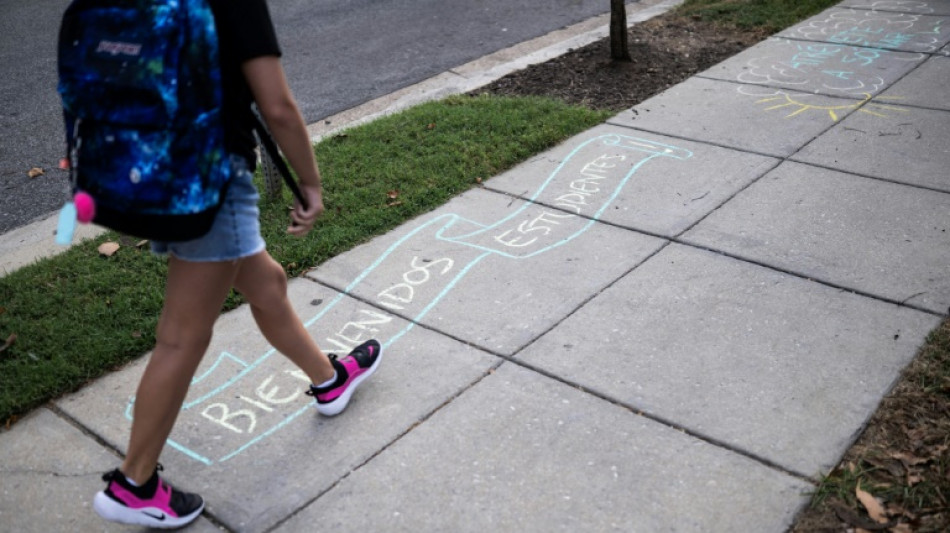
New school year in Washington marked by fear of anti-migrant raids

Neighbors, volunteers and parents escorted children to the first day of the new school year across Washington on Monday, vowing to protect students from Donald Trump's deportation drive.
At one elementary school in the US capital, crowds blew whistles, shook tambourines and cheered children on their way to class, ready to fend off any law enforcement action and to support a neighborhood with a high Latino population.
Throughout the city, chaperone groups, carpools and patrols were organized over fears that immigration agents, who have stepped up arrests and sweeps, could target school campuses.
Resident Helena Bonde, 36, showed up at the elementary school in her wheelchair to support immigrant families who she says have been terrorized by raids, with some neighbors afraid to go to the grocery store.
"Nobody's trying to arrest a disabled white woman right now, so I just figured I'll be wherever I can be," Bonde told AFP.
"Everybody really just wanted to help out in a way that could feel concrete and useful and help make our local families feel a little safer."
The Immigration and Customs Enforcement (ICE) agency said it would not target Washington schools on Monday.
But it has not ruled out activity on school campuses to conduct welfare checks on undocumented and unaccompanied children that the Trump administration says need to be rescued from sex trafficking and forced labor rings.
On Monday "you are not going to see ICE officers doing a raid or a sweep," ICE chief Todd Lyons told NBC News last week.
"But our goal... is finding those 300,000 undocumented children and those minors that came here through the last administration."
- 'It's about how you look' -
Selene, a Mexican-American community organizer, admitted that the thought of not sending her daughter to school crossed her mind because even Latino families residing in the United States legally have been targeted and detained.
"This is not about status. It's about how you look, right? If you look Latino on the street, you're a target, unfortunately," Selene, who declined to give her last name, told AFP.
In the end, encouraged by her neighbors, Selena walked her daughter to school and urged others to do the same.
"The community is here for you, don't be afraid, and we're going to keep up the great work. We're going to keep helping our community members. Our kids who come to school need to feel safe, and we can do that together," she said.
Others, however, were too frightened.
Blanca, a middle-aged immigrant from El Salvador who stood near the school entrance with a sign that read "Every day is an opportunity" in English and in Spanish, said some families had kept their children home, at least temporarily, out of fear of being deported.
"Because they are scared," Blanca, who declined to give her last name for safety reasons, told AFP. "We are scared to go out. We don't know what's going to happen to us. We're not safe."
- Compulsory education -
According to the DC Fiscal Policy Institute, the US capital was home to about 25,000 undocumented migrants in 2023.
While city schools do not collect citizenship information on students, a 2022 Washington Post report quoted a DC council member as estimating that there are from 3,000 to 4,000 undocumented students in Washington schools.
In California, home to the largest immigrant population in the United States, ICE raids that began after Trump's return to the White House in January have caused a spike in student absences, according to the National Education Association.
Jeffrey Freitas, president of the California Federation of Teachers, cited a landmark 1982 Supreme Court ruling that established that states cannot prevent undocumented children from attending public schools.
"What they're doing, this is inhumane. This is trying to put fear into these communities," Freitas told AFP.
"Education is compulsory for every student in the United States. That's what we have to go by."
Lora Ries, of the conservative Heritage Foundation, confirmed that "kids are, no matter what their immigration status, under the Supreme Court decision, able to go to public schools, so they are not at risk."
But, she added, "If someone is here illegally, then they should get right with the law."
P. Duarte--JDB

 London
London

 Manchester
Manchester
 Glasgow
Glasgow
 Dublin
Dublin
 Belfast
Belfast
 Washington
Washington
 Denver
Denver
 Atlanta
Atlanta
 Dallas
Dallas
 Houston Texas
Houston Texas
 New Orleans
New Orleans
 El Paso
El Paso
 Phoenix
Phoenix
 Los Angeles
Los Angeles



